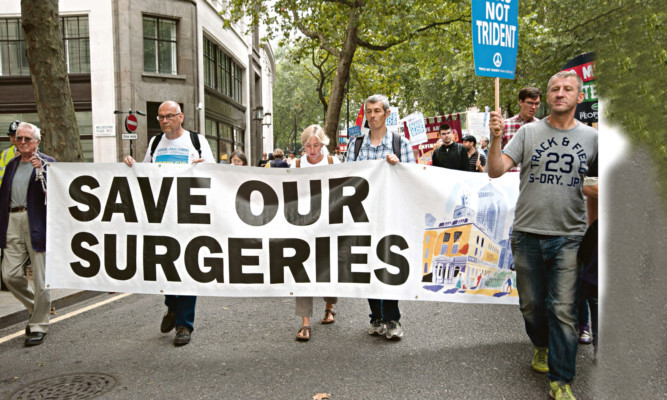
Doctors’ surgeries are closing at a rate of seven a month leaving hundreds of thousands of patients in the lurch.
The Sunday Post has learned almost 500 GP practices in England have shut their doors in the last six years and more than 500 are at risk.
It’s feared the situation is piling increasing pressure on beleaguered A&E departments.
Concerns have also been raised about patients having to travel further to see a doctor and wait weeks for appointments.
The revelations come after Dr Mark Porter, council chairman of the British Medical Association, warned whoever forms the next Government will be “tempted” to introduce fees for GP appointments.
Dr Maureen Baker, chairman of the Royal College of GPs, said even more patients, many elderly and vulnerable, could be left with no GP unless there is huge investment.
“Across the country we have a severe shortage of GPs,” she said.
“The college estimates that in England we need at least 8,000 more GPs by 2020 to cope with the increasing demands of a growing and ageing population.
“GPs keep patients out of hospital, where care is more expensive, and close to home, where they want care most.
“General practice is the cornerstone of the health service.
“But if this is to continue, we need more investment in general practice and more GPs.”
The organisation has also identified 543 practices in England where 90% of practicing doctors are over 60. This is despite the average GP retiring at 59.
Dr Baker’s concerns were backed by Katherine Murphy, chief executive of the Patients’ Association, who warned a shortage of GP practitioners was “one of the most challenging problems facing the NHS.”
Worrying figures published by the Health and Social Care Information Centre reveal the number of GPs has risen by just 209 from 36,085 in 2009 to 36,294 in 2013.
That is despite senior doctors saying GPs are dealing with 40 million more cases than a decade ago.
Mrs Murphy said: “Inevitably it is patients who suffer as surgery waiting times get longer and pressure on A&E departments intensifies.”
Figures obtained by Labour MP Andrew Gwynne have revealed the huge scale of GP practice closures since 2009. Between July 2009 and March this year, 484 have shut their doors in England.
The NHS defended the closures, pointing out that some will have been practices merging or forming federations with other practices to pool their resources.
However, Dr Baker said: “In some areas, particularly remote and rural areas, practices closing can severely restrict access for patients and this needs to be avoided where possible.”
Mr Gwynne, a shadow health minister, said closures made under the Coalition Government were letting down sick and frail patients.
He said hospitals were “bursting at the seams” with patients who should be visiting their family doctor after A&E units suffered one of the worst winters on record.
Mr Gwynne added: “Millions of people are waiting too long to see their family doctor and these shocking figures help to explain why.”
His comments follow news last week that soaring numbers of GPs practicing in the NHS are from abroad, with foreign doctors brought in to combat a severe shortage of staff.
They now account for one family doctor in five up 11% on a decade ago.
Pharmacists are also treating patients for injuries such as minor burns, scalds, neck sprain and earache, to ease the pressure on A&E units and GP practices.
Dr Porter of the British Medical Association said ministers could be tempted to introduce GP appointment charges because there are already fees paid for dentistry and prescriptions.
But he warned they “must resist that temptation”.
A spokesman for the Department of Health said it was unable to comment because of the period of purdah ahead of the General Election.
But in a response to Mr Gwynne’s Parliamentary question, health minister Dr Daniel Poulter, said a fund of £150 million had been made available to pilot new ideas to give more patients access to their family doctors.
These include offering appointments from 8am to 8pm, seven days a week and more consultations by e-mail and via video technology such as Skype, allowing GP consultations in patients’ own homes.
Dr Poulter said: “The most recent GP patient survey found that 85.2% of patients rate their overall experience of their GP practice as good and 73.8% of patients rated their overall experience of making an appointment as good.”

Enjoy the convenience of having The Sunday Post delivered as a digital ePaper straight to your smartphone, tablet or computer.
Subscribe for only £5.49 a month and enjoy all the benefits of the printed paper as a digital replica.
Subscribe